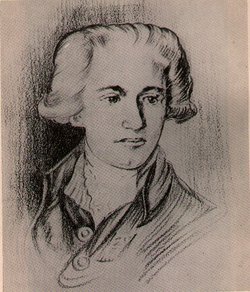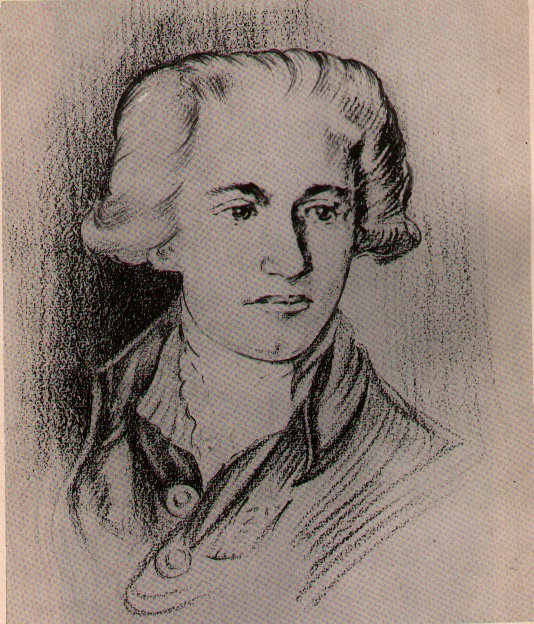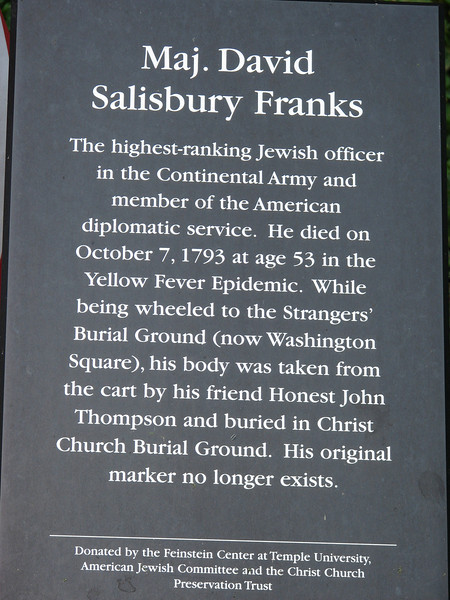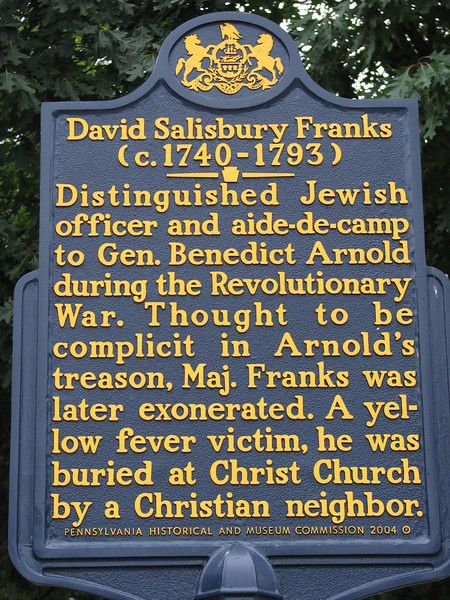(The family name was Franco-deCosta prior to the arrival of the grandfather to America. It meant the DeCosta from France. The word Franks is used to designate a person born in Alsace Lorraine.)
Aid-de-camp of General Benidict Arnold and General George Washington. David Salisbury Franks is the grandson of the English merchant Abraham Franco-de Costa, who changed the family name to Franks, after his large family arrived in America. Then, as now, David is often confused with his notorious Uncle. Over the years members of the family settled in Montreal, New York and Philadelphia. John Franks, David's father settled in Philadelphia and he enrolled his son at the Academy and University (later called The University of Pennsylvania)in 1760. In the late 1860's David moved with his father to Montreal. David quickly became a leader in the community. He was elected Ha-Parnas ha Junta (head of the community) of Sharith Israel (the Spanish and Portuguese).
David's career as a rebel began on November 12, 1774, when he and several other Jewish residents of Quebec protested the "Quebec Act". This ast had many provisions. Most proximate was the assurance of British rule and law would prevail in Quebec. (The British defeated the French on the Plains of Abraham, years before in the War (French-Indian War)). On May 1, 1775, the day the "Quebec Act" was to take effect, someone painted a bust of King George III, which was located on the Place d'Arms in Montreal, with foul smelling paint. The Bust was decorated with a wreath of Potatoes and a sign:" Behold the Pope of Canada and the English Fool". A reward of 100 Guineas was offered to find the perpetrator. David Franks became a suspect when he and a Frenchman (Mr.Henri de Bellestre) exchanged words. Mr. de Bellestre, in order to prove his patriotism, shouted that the perpetrator should be hung. Franks retorted that " In England men are not hung for such small offences." The pair exchange words and then blows. On May 3d, a complaint was filed against Franks and a warrant was issued for his arrest. He was taken from the synagogue to the prison by bayonet point and fined 10,000 pounds. Frank refused to pay even bail. He was held in jail about a week when he was discharged by then Governor Carleton. In November of 1775 General Montgomery occupied Montreal. Many merchants feared any dealings with the Americans would spell trouble r the community, no mater which way the war went. David chose to join the revolutionary party, which supported the "invasion and liberation of Quebec".
Under Montgomery Franks became the Paymaster of the Continental army. Records demonstrate that he often used his own money to pay the troops. In 1776 General Wooster appointed him paymaster of the Montreal Garrison. When the American Campaign in Canada began to falter he enlisted in a Massachusetts regiment and was allowed to fight (June 29, 1776). However we know from a letter dated May 8, 1777. from Sir Guy Carleton to Lord George Germaine, in England, that David Franks was still listed as an active leader of the "sedation" in Canada. We know that he returned to America as a Major, whose duties were the adjutant and security (Aid de camp) for General Benedict Arnold, the then military governor
of Philadelphia.
Because he spoke French Congress appointed him the liaison officer to the Comte d'Estaing, commander of French naval forces. Because Arnold had alienated many in Philadelphia he was forced to remove his staff to West Point. When Arnold's treason became known, many of his subordinate officers fell under suspicion, including Franks. What would propel Franks' case more was the fact that David ‘s uncle David (born in New York and settled in Philadelphia and Montreal) an active Tory. After the intensive investigation Franks was exonerated. What really hurt him later was that Arnold and Andre' wrote letters saying he was not involved.
In 1779 he was transferred to Aid-de camp of General Lincoln's troops at Charlestown.
Although he was a witness at Arnold's trial some officers started a whispering campaign.Congress had him arrested on October 1780. He was acquitted the next day. Again some whispers drew attention to his behavior. Washington had him assigned to his command to demonstrate his innocence and trust. More rumors surfaced so Franks petitioned Washington to hold a board of inquiry. The Board was held at West Point on November 2, 1780. He was exonerated and he was reinstated as a major and Washington's Aid de Camp.
In 1781 he was sent by the superintendent of finance, Robert Morris, to carry secret documents to Benjamin, in Paris, and John Jay in Madrid. In 1781 he delivered the signed peace treaty to Franklin. On January 15, 1784 Congress resolved that "a triplicate of the definitive treaty (of peace) be sent out to the ministers lenipotentiary by Lieut. Col. David S.Franks.".
In 1785 he served as the vice council at Marseilles. In 1786 he served as a special envoy to Morocco and brought a treaty home with him in 1787. Political opponents, from the Jeffersonian Republicans, continually attacked Franks for his supposed links to Arnold and managed to have him removed from the diplomatic corps for a time. In 1789 Congress not only exonerated him but issued him 400 acres. He served in various minor positions until his death. His last appointment was that of assistant casher at the Bank of the United States in Philadelphia (now the Mint).
David Salisbury died of yellow fever in October 1793. He was living in poverty and his body was saved by a Christian neighbor from the potters' field and paid for a plot in Christ Church Burial Ground.∼Major Franks was a Jewish officer and aide de camp to Benedict Arnold during the Revolutionary War. He died of Yellow Fever on October 7th 1793. Maj. Franks was being taken off to the strangers burial ground when his Christian neighbor and friend Honest John Thompson had him buried in the Christ church burial ground along with 7 other people that day. The burial of Franks in the Christ Church Burial Ground was documented in church records and in a letter by Dr. Benjamin Rush. He is buried in an unknown location in the graveyard. A plaque has been placed in his memory near the front of the Burial Ground.
(The family name was Franco-deCosta prior to the arrival of the grandfather to America. It meant the DeCosta from France. The word Franks is used to designate a person born in Alsace Lorraine.)
Aid-de-camp of General Benidict Arnold and General George Washington. David Salisbury Franks is the grandson of the English merchant Abraham Franco-de Costa, who changed the family name to Franks, after his large family arrived in America. Then, as now, David is often confused with his notorious Uncle. Over the years members of the family settled in Montreal, New York and Philadelphia. John Franks, David's father settled in Philadelphia and he enrolled his son at the Academy and University (later called The University of Pennsylvania)in 1760. In the late 1860's David moved with his father to Montreal. David quickly became a leader in the community. He was elected Ha-Parnas ha Junta (head of the community) of Sharith Israel (the Spanish and Portuguese).
David's career as a rebel began on November 12, 1774, when he and several other Jewish residents of Quebec protested the "Quebec Act". This ast had many provisions. Most proximate was the assurance of British rule and law would prevail in Quebec. (The British defeated the French on the Plains of Abraham, years before in the War (French-Indian War)). On May 1, 1775, the day the "Quebec Act" was to take effect, someone painted a bust of King George III, which was located on the Place d'Arms in Montreal, with foul smelling paint. The Bust was decorated with a wreath of Potatoes and a sign:" Behold the Pope of Canada and the English Fool". A reward of 100 Guineas was offered to find the perpetrator. David Franks became a suspect when he and a Frenchman (Mr.Henri de Bellestre) exchanged words. Mr. de Bellestre, in order to prove his patriotism, shouted that the perpetrator should be hung. Franks retorted that " In England men are not hung for such small offences." The pair exchange words and then blows. On May 3d, a complaint was filed against Franks and a warrant was issued for his arrest. He was taken from the synagogue to the prison by bayonet point and fined 10,000 pounds. Frank refused to pay even bail. He was held in jail about a week when he was discharged by then Governor Carleton. In November of 1775 General Montgomery occupied Montreal. Many merchants feared any dealings with the Americans would spell trouble r the community, no mater which way the war went. David chose to join the revolutionary party, which supported the "invasion and liberation of Quebec".
Under Montgomery Franks became the Paymaster of the Continental army. Records demonstrate that he often used his own money to pay the troops. In 1776 General Wooster appointed him paymaster of the Montreal Garrison. When the American Campaign in Canada began to falter he enlisted in a Massachusetts regiment and was allowed to fight (June 29, 1776). However we know from a letter dated May 8, 1777. from Sir Guy Carleton to Lord George Germaine, in England, that David Franks was still listed as an active leader of the "sedation" in Canada. We know that he returned to America as a Major, whose duties were the adjutant and security (Aid de camp) for General Benedict Arnold, the then military governor
of Philadelphia.
Because he spoke French Congress appointed him the liaison officer to the Comte d'Estaing, commander of French naval forces. Because Arnold had alienated many in Philadelphia he was forced to remove his staff to West Point. When Arnold's treason became known, many of his subordinate officers fell under suspicion, including Franks. What would propel Franks' case more was the fact that David ‘s uncle David (born in New York and settled in Philadelphia and Montreal) an active Tory. After the intensive investigation Franks was exonerated. What really hurt him later was that Arnold and Andre' wrote letters saying he was not involved.
In 1779 he was transferred to Aid-de camp of General Lincoln's troops at Charlestown.
Although he was a witness at Arnold's trial some officers started a whispering campaign.Congress had him arrested on October 1780. He was acquitted the next day. Again some whispers drew attention to his behavior. Washington had him assigned to his command to demonstrate his innocence and trust. More rumors surfaced so Franks petitioned Washington to hold a board of inquiry. The Board was held at West Point on November 2, 1780. He was exonerated and he was reinstated as a major and Washington's Aid de Camp.
In 1781 he was sent by the superintendent of finance, Robert Morris, to carry secret documents to Benjamin, in Paris, and John Jay in Madrid. In 1781 he delivered the signed peace treaty to Franklin. On January 15, 1784 Congress resolved that "a triplicate of the definitive treaty (of peace) be sent out to the ministers lenipotentiary by Lieut. Col. David S.Franks.".
In 1785 he served as the vice council at Marseilles. In 1786 he served as a special envoy to Morocco and brought a treaty home with him in 1787. Political opponents, from the Jeffersonian Republicans, continually attacked Franks for his supposed links to Arnold and managed to have him removed from the diplomatic corps for a time. In 1789 Congress not only exonerated him but issued him 400 acres. He served in various minor positions until his death. His last appointment was that of assistant casher at the Bank of the United States in Philadelphia (now the Mint).
David Salisbury died of yellow fever in October 1793. He was living in poverty and his body was saved by a Christian neighbor from the potters' field and paid for a plot in Christ Church Burial Ground.∼Major Franks was a Jewish officer and aide de camp to Benedict Arnold during the Revolutionary War. He died of Yellow Fever on October 7th 1793. Maj. Franks was being taken off to the strangers burial ground when his Christian neighbor and friend Honest John Thompson had him buried in the Christ church burial ground along with 7 other people that day. The burial of Franks in the Christ Church Burial Ground was documented in church records and in a letter by Dr. Benjamin Rush. He is buried in an unknown location in the graveyard. A plaque has been placed in his memory near the front of the Burial Ground.







